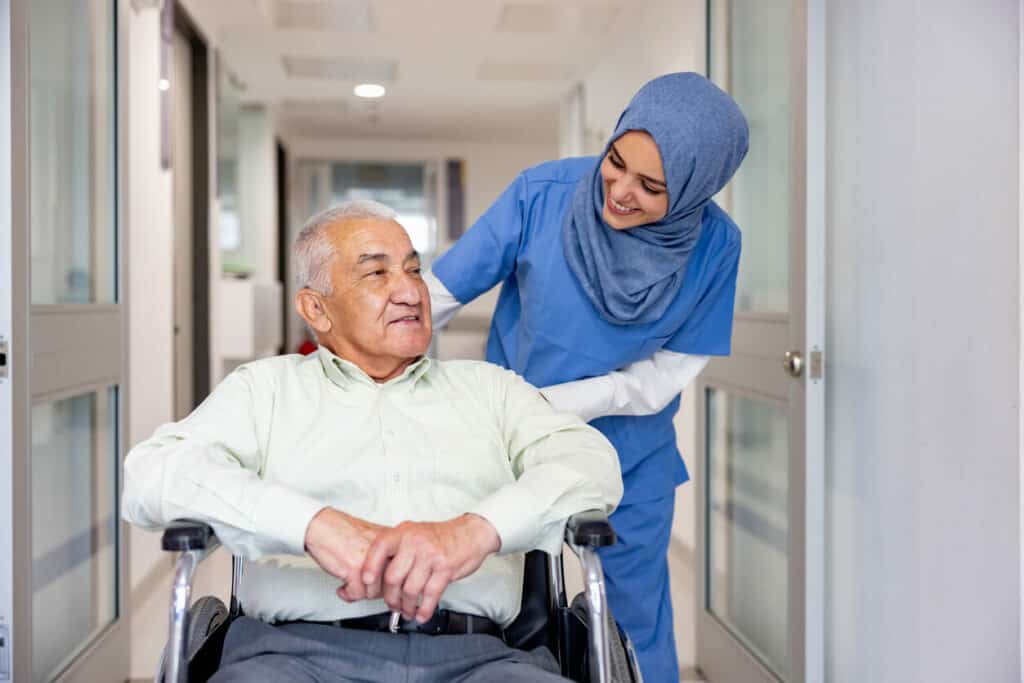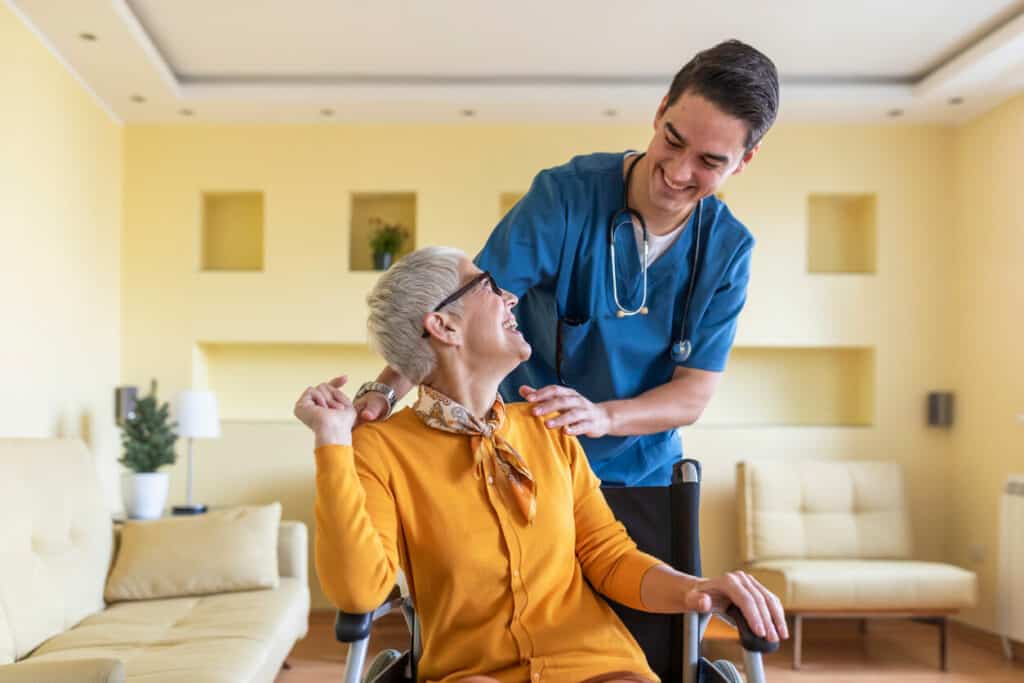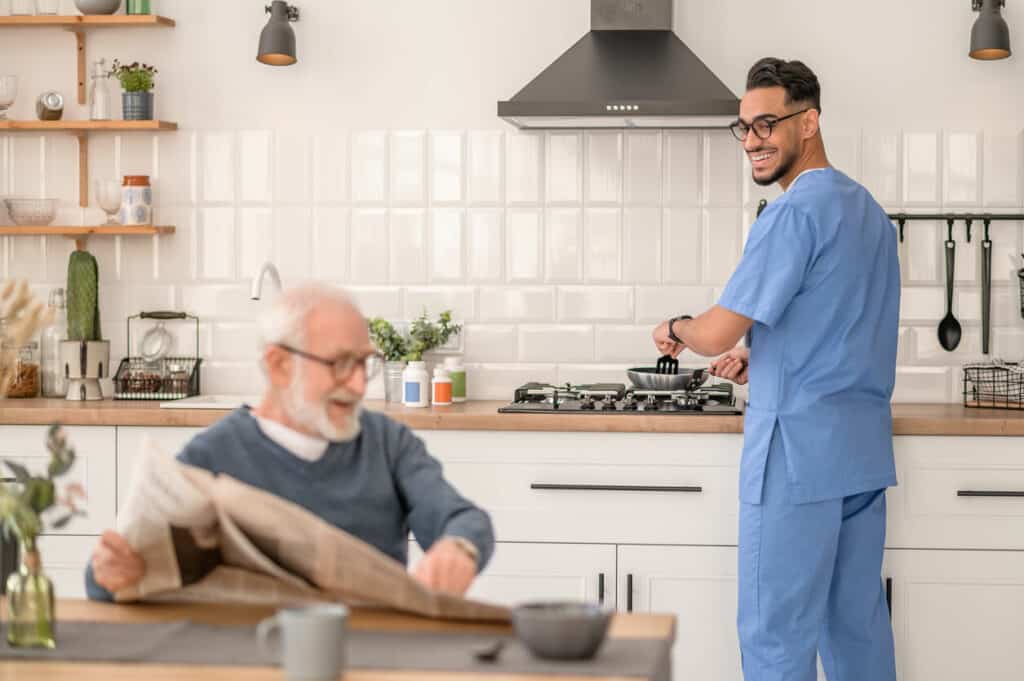As they age, many of our loved ones start requiring assistance in daily activities, such as bathing, dressing, and preparing meals.
According to an analysis from the Committee on Family Caregiving for Older Adults, more than half of Americans older than 65 years will require assistance with basic needs after that age, at least for a while.
In 2023, jobs caring for the elderly continue to be in high demand across many states. These jobs offer the opportunity to review and improve the quality of life for elderly individuals who require assistance in their daily routines.
Caregivers provide this much-needed assistance by helping with tasks such as dressing, bathing, preparing meals, and many others, enabling our beloved seniors to maintain their quality of life and independence from their families.
The American population is aging. By 2040, people in the US older than 65 years are expected to double until they reach 80 million.
So, as the years go by, more and more seniors are expected to need caregiving services provided by devoted and capable professionals who love the elderly just as you do.

So, how can you become part of this workforce on the rise and earn your living as a caregiving professional?
1 – Types of Caregiver Jobs
Even though all typical jobs related to giving care to the elderly deal with day-to-day tasks, they differ in important aspects, like how long the helpers need to be available throughout the day or if they should assist with health-related tasks.
In consequence, it’s important to understand the differences between different types of senior caregivers so you can choose the best match for your skills and what you’d feel most comfortable doing.
The following are the most representative types of elderly care jobs.
Home Health Aides
Home health aides provide in-home care for seniors who are chronically ill. They help clients with daily tasks such as bathing, dressing, grooming, administering medications, and monitoring vital signs.
Home health aides work closely with elderly clients and their families to develop care plans that meet their seniors’ unique medical and general needs. Since they’ll be assisting with health-related responsibilities, this type of caregiver requires a certification from a state authority.

Personal Care Aides
Personal care aides are non-medical professionals who assist clients with daily activities such as bathing, grooming, and dressing. They may also help with meal preparation, light housekeeping, transportation to appointments, and other errands.
Personal care aides work in a variety of settings, including clients’ homes, group homes, and assisted living facilities, but they normally do not perform any activities that deal with the health of their senior clients.
Nursing Assistants
Nursing assistants specialize in providing basic patient care in hospitals, nursing homes, and other healthcare facilities. They help patients with daily tasks, but their focus is on the health of their senior clients, so they perform duties like taking vital signs and recording patient information.
Nursing assistants work closely with nurses and doctors to complement high-quality patient care. In the US, they must complete a state-approved education program and pass a competency exam to become certified and be able to perform their duties.

Respite Caregivers
Respite caregivers provide temporary relief for primary caregivers of the elderly. They allow primary caregivers to take a break from their duties and attend to their own needs and responsibilities.
Respite caregivers provide companionship, assistance with daily tasks, and emotional support to their elderly clients and, if the occasion allows for it, to the primary caregivers of their seniors.
Live-in Caregivers
Live-in caregivers provide 24-hour care for elderly individuals who require constant assistance.
Live-in caregivers may be required to live in the client’s home or have their own separate living space on the same property. This allows them to be available for any emergencies or to provide support during the night.
They provide companionship, assistance with daily tasks, and emotional support to their clients. Live-in caregivers may also help administer medications and monitor health signs.

2 – How to
Earn a Living as a Caregiving Professional
Being a caregiving professional is an extremely rewarding experience. You’ll get to spend quality time and develop a bond with your elderly clients, who have a lifetime of experiences, wisdom, and love to share with you.
Often, when working in elderly care services, you will be offered a good income and benefits, including insurance and expenses covered by the employer. For family members who consider this as employment, it also enables them to receive a secure income while offering a valuable service to the community.
In addition to the financial benefits, the emotional benefits of making a connection with an elderly member of the community can be significant. There are many options available, including part-time and full-time employment, and a list of performance-based rewards and incentives to request from employers.
The pay for caregiving professionals can vary depending on the type of job and the level of experience.
For example, according to the Bureau of Labor Statistics, the median pay for home health aides and personal care aides was $29,260 per year in 2021, while nursing assistants had a median pay of $33,250 per year.
In general, all the types of caregiving professionals we mentioned help seniors with personal care and hygiene, but one important difference, as you saw in the descriptions above, is the amount of health-related work you’d do for your senior clients.

To be able to perform health-related tasks, you’ll need a certification from the corresponding state authority. That’s why many caregivers start as personal assistants or respite caregivers and then do the process to get their home health aide certifications and even become registered nurses.
Whichever type of caregiver you become, you’ll require a range of skills, both practical and interpersonal, such as:
- Communication Skills: Caregivers need excellent communication skills, including active listening, empathy, and the ability to communicate effectively with seniors who may have hearing, speech, or cognitive impairments.
- Patience: Seniors may require extra time and assistance with tasks due to physical or cognitive limitations, so caregivers must have patience and a willingness to work at the pace of the senior.
- Compassion: Care aides need to be compassionate and understanding, recognizing that seniors may be going through a challenging time in their lives and dealing with complex feelings.
- Flexibility: Caregiving can be unpredictable, so helpers of all kinds need to be flexible and adapt to changes in their client’s needs or schedules. The priority should always be to provide support to the satisfaction of our elderly clients.
- Time Management: Aides need to be able to manage their time effectively, balancing the needs of one or multiple clients and completing tasks within the allotted time frame.
- Physical Strength: Caregiving can be physically demanding, requiring the ability to lift and move clients and to perform tasks such as housekeeping and meal preparation.
- Problem-Solving: Helpers need to be able to think critically and solve problems quickly, especially in emergencies.
- Attention to Detail: Even if they’re not in charge of their seniors’ health, caregivers need to pay close attention to changes in their client’s appearance or behavior that might indicate medical issues.

Caring for the elderly requires frequent contact and a compassionate approach to ensure that their needs are met while also ensuring their safety and security. This entails regularly checking up on them, providing good respite care options for family members who need a break, and offering training to staff members to ensure they are well-equipped to handle dementia and other issues that may arise.
3 – Conclusion
In caring for the elderly, it is important to consider the welfare of both the elderly individual and their family members. Many care services offer respite care options to enable family members to take a break and attend to other responsibilities, while still ensuring that their loved one receives the care they need. As a result, jobs caring for the elderly are a win-win solution for both the employee and the community at large.
As more and more people come of age in America, professional caregivers play an increasingly crucial role in maintaining the quality of life and happiness of our elderly adults.
If you love the elderly and have a passion for caregiving, you can have a successful and rewarding career helping senior citizens live life to their best while you develop lasting relationships that will positively impact you for the rest of your life.
So, if you are set on building a career in elderly caregiving or if you already have a trajectory in this area, we would love to have you as part of Amy’s Eden team.
Amy’s Eden was founded by Amy and her daughter with the mission of providing care to a growing population of elderly adults that need us to support them in their golden years.
We want to give them back a little of all they’ve given us during their lifetime.
That’s why we’ve designed a premium caregiving concept that ensures our elderly clients get the level of attention and assistance they need.
Each of our assisted living homes only hosts two seniors who have 24/7 care at their disposal. Also, every one of our homes is set up with all the functional features and amenities at the service of just a pair of elderly clients.
This way, we ensure all our seniors get full attention and top-tier comfort and care.
It’s the same case with our in-home caregivers, who are experts in adapting to each client’s environment and particular needs and can assist them as respite caregivers for only a few hours or as 24-hour personal and health aides.
Do you want to be part of this amazing team? Then, reach out to us. We’re always looking for capable and loving caregivers ready to give it all for our beloved seniors.




